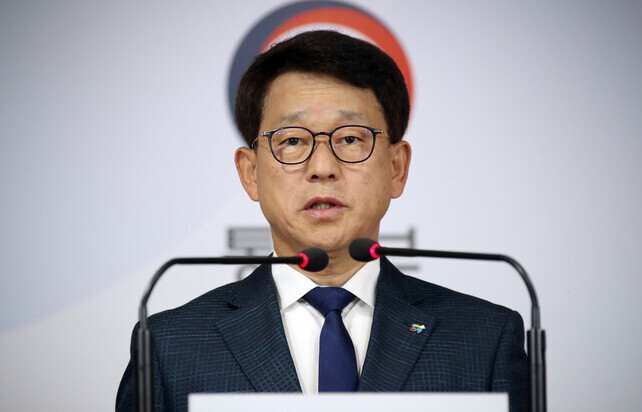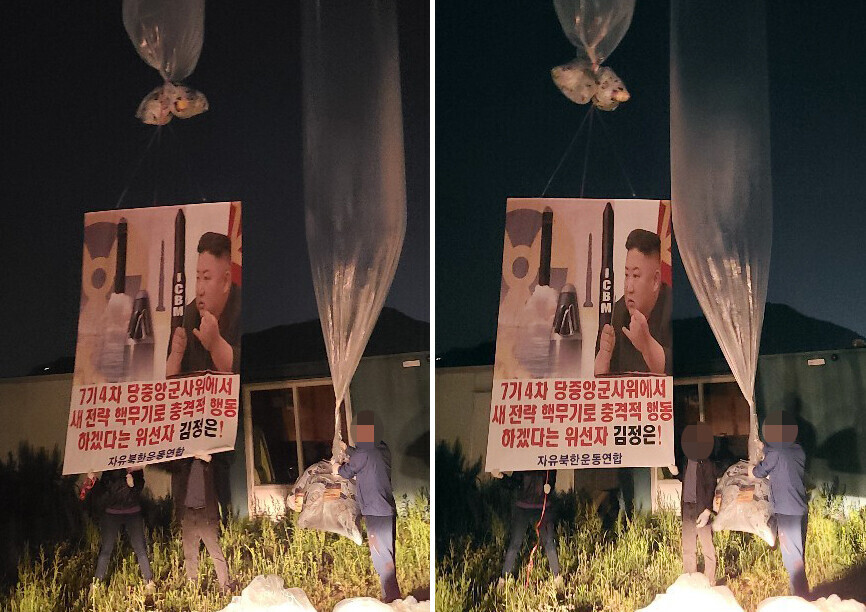hankyoreh
Links to other country sites 다른 나라 사이트 링크
[News analysis] Unification Ministry to revoke N. Korean defector groups of corporation status

On June 10, the Ministry of Unification (MOU) announced that it plans to charge the two North Korean defector groups Fighters for Free North Korea (FFNK) and Keun Saem with violations of positive law and initiate procedures to revoke their corporation status after they launched propaganda balloons and plastic bottles over the border into North Korea. This amounts to a declaration that the government is changing its approach in response to the scattering of leaflets in North Korea. The decision sends the message that the weight is being shifted from “policing without punishment” to “policing, punishments, and crackdowns at the source.”
The law cited by MOU as a basis for punishing propaganda balloon launches is the Inter-Korean Exchange and Cooperation Act. Article 13-1 of that act states that approval from the MOU must be received to take or send items into North Korea, while Article 27 states that the transport of items without approval is punishable by up to three years in prison or a fine of up to 30 million won (US$25,102).
But no administration to date -- the Moon Jae-in administration included -- has yet invoked the Inter-Korean Exchange and Cooperation Act in response to balloon launches. There’s a reason for that. The Lee Myung-bak administration produced an authoritative interpretation stating that balloon launches were not subject to MOU approval because its recipients are unspecified North Koreans, which means that it does not constitute an act of trade. Because of this, the MOU has been reluctant to pursue National Assembly legislation to police or punish balloon launches under the Inter-Korean Exchange and Cooperation Act.
This marks the first time the administration is attempting to punish the balloon launches as a form of unauthorized transport in violation of the Inter-Korean Exchange and Cooperation Act. For this reason, an outcry is anticipated from the United Future Party and other conservative parties and media over the MOU’s announcement on June 10.

As if conscious of this, the MOU provided a detailed explanation of its grounds for the “change in circumstance,” with the alteration of the authoritative interpretation to invoke the Inter-Korean Exchange and Cooperation Act to police and punish the launches of balloons in North Korea. As stated by MOU officials, the grounds for the “change in circumstance” included the Panmunjom Declaration of Apr. 27, 2018, which included an agreement to “stop all the hostile acts including the [. . .] scattering of [propaganda] leaflets”; a Supreme Court ruling on Feb. 25, 2016, affirming the legality of the state (government) barring balloon launches due to the “severe and imminent risk to the lives and persons of border residents”; concerns that the propaganda leaflets could serve as a vector for the transmission of infectious disease between South and North; appeals from residents near the border citing perceived threats to their lives and safety; and the increased diversity and scale of the launches, with items such as radios, US currency, USB devices, and rice also included in the balloons.
Indeed, legal experts have been arguing from the outset that the balloon launches should be policed and punished as a violation of the Inter-Korean Exchange and Cooperation Act. In a column published in October 2014 while he was a law professor at Chonnam National University, current National Assembly Research Service Chief Kim Ha-joong stated that propaganda distribution was “subject to approval by the Ministry of Unification according to the Inter-Korean Exchange and Cooperation Act,” adding that it in fact constituted “abandonment of duty” (according to Article 122 of the Criminal Act) not to police or punish acts of unapproved distribution. His argument was the balloons corresponded to “advertisements and/or printed matter,” the transportation of which is subject to MOU approval according to the Inter-Korean Exchange and Cooperation Act (MOU Notice 2012-2).
With its announcement of plans to pursue procedures to revoke the corporation status of the FFNK and Keun Saem, the MOU signaled its aim of implementing policies to crack down on balloon launches at the source. Both groups are registered with the MOU as non-profit corporations. Civil law states that a non-profit corporation’s approval may be revoked in cases where it harms the public interest, engaged in activities beyond its founding aims, or violates the conditions for its approval. An MOU official explained, “Fighters for Free North Korea received establishment approval by stating that its activities would be ‘within a scope that is not detrimental to the implementation of the government’s reunification policies,’ and Keun Saem by stating that it was ‘supporting young defectors from North Korea.’”
“We plan to initiate procedures to revoke their approval based on these violations,” the official added. Park Sang-hak, the executive director of FFNK, and Park Jeong-oh, director of Keun Saem, are brothers who both defected from North Korea.
The change in MOU’s policy approach can be attributed both to the stubborn stance of the FFNK -- which has announced plans to distribute 1 million leaflets to North Korea for the 70th anniversary of the outbreak of the Korean War on June 26, despite objections and efforts to stop it both by the South Korean government and by local governments and residents in the border region -- and the objections voiced by North Korean authorities.
The MOU’s announcement on June 10 came after coordination with the Blue House and other related ministries -- signaling a change of approach across the entire administration. It’s a move to emphasize its commitment to enforcing the terms of the Panmunjom Declaration to prevent additional souring of inter-Korean relations and potentially bring about improvements in ties, despite the political risks associated with the domestic debate over policing and punishing the balloon launches.
Attention is now turning to the response from authorities in North Korea, where mass demonstrations have been organized for consecutive days over the launches and receiving major coverage in the Rodong Sinmun newspaper for five straight days.
To prevent the balloon launches, police have reportedly dispatched five squadrons (around 400 officers) to 36 locations in Paju and Yeoncheon, Gyeonggi Province, that serve as major bases for the defector groups’ activities, as well as two additional units (60 officers) in Ganghwa County, Incheon.
By Lee Je-hun, senior staff writer
Please direct comments or questions to [english@hani.co.kr]

Editorial・opinion
![[Editorial] Does Yoon think the Korean public is wrong? [Editorial] Does Yoon think the Korean public is wrong?](https://flexible.img.hani.co.kr/flexible/normal/500/300/imgdb/original/2024/0417/8517133419684774.jpg) [Editorial] Does Yoon think the Korean public is wrong?
[Editorial] Does Yoon think the Korean public is wrong?![[Editorial] As it bolsters its alliance with US, Japan must be accountable for past [Editorial] As it bolsters its alliance with US, Japan must be accountable for past](https://flexible.img.hani.co.kr/flexible/normal/500/300/imgdb/original/2024/0417/6817133413968321.jpg) [Editorial] As it bolsters its alliance with US, Japan must be accountable for past
[Editorial] As it bolsters its alliance with US, Japan must be accountable for past- [Guest essay] Amending the Constitution is Yoon’s key to leaving office in public’s good graces
- [Editorial] 10 years on, lessons of Sewol tragedy must never be forgotten
- [Column] A death blow to Korea’s prosecutor politics
- [Correspondent’s column] The US and the end of Japanese pacifism
- [Guest essay] How Korea turned its trainee doctors into monsters
- [Guest essay] As someone who helped forge Seoul-Moscow ties, their status today troubles me
- [Editorial] Koreans sent a loud and clear message to Yoon
- [Column] In Korea’s midterm elections, it’s time for accountability
Most viewed articles
- 1‘Right direction’: After judgment day from voters, Yoon shrugs off calls for change
- 2[Editorial] As it bolsters its alliance with US, Japan must be accountable for past
- 3[Editorial] Does Yoon think the Korean public is wrong?
- 4Japan officially says compensation of Korean forced laborers isn’t its responsibility
- 5Where Sewol sank 10 years ago, a sea of tears as parents mourn lost children
- 6[Guest essay] How Korea turned its trainee doctors into monsters
- 7‘National emergency’: Why Korean voters handed 192 seats to opposition parties
- 8Japan ramps up efforts to remilitarize, integrate with US to deter China
- 9Samsung may have won billions in US chip subsidies, but the real challenge lies ahead
- 10Gangnam murderer says he killed “because women have always ignored me”